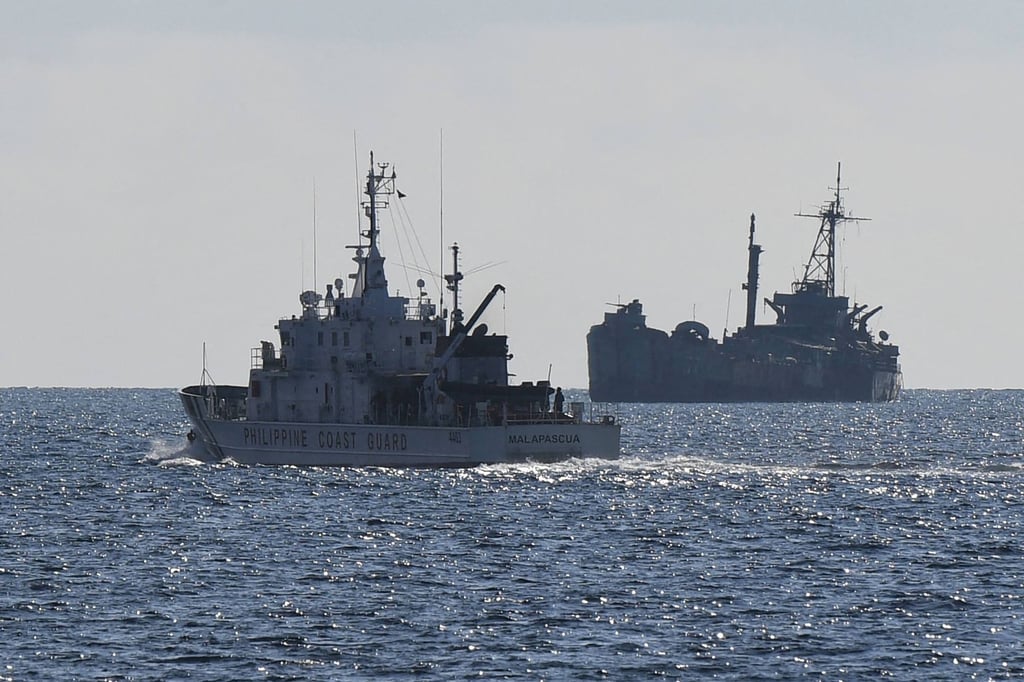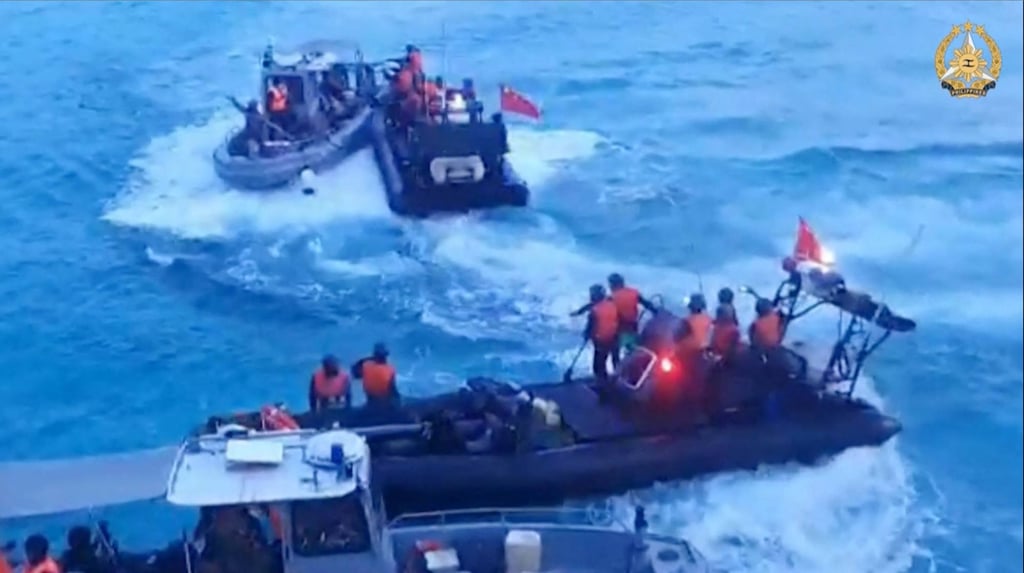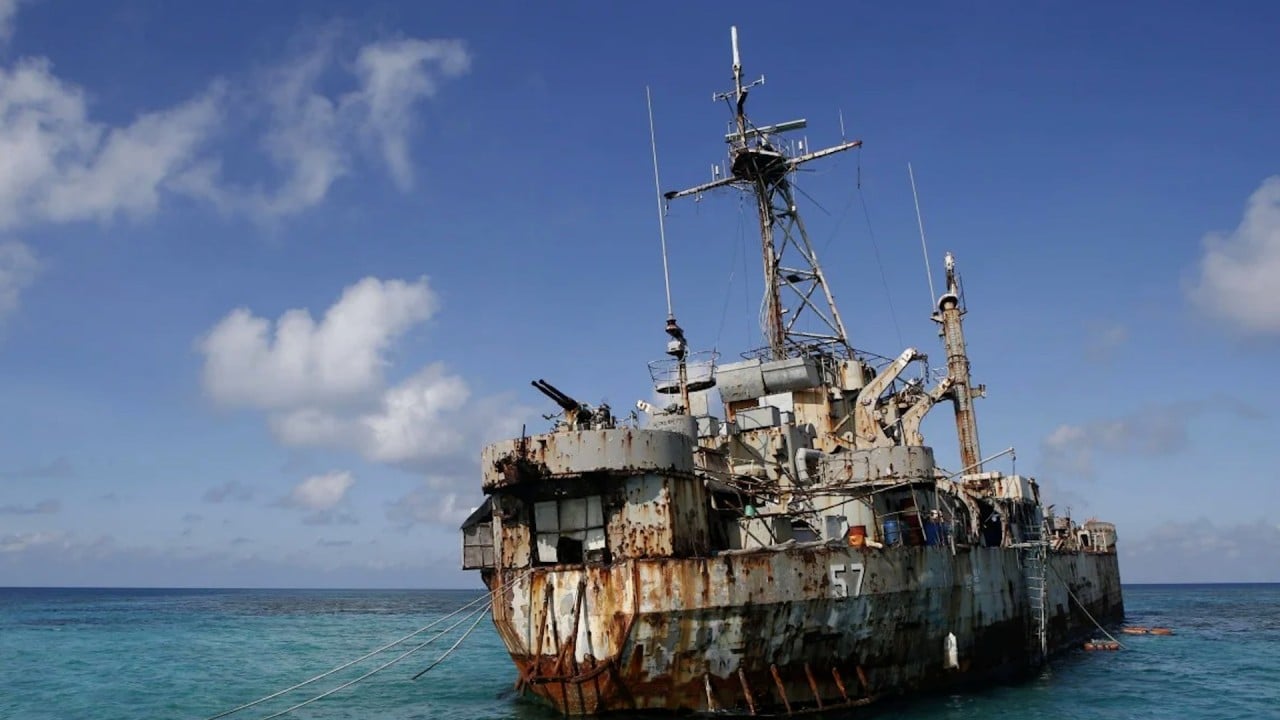South China Sea: doubts surface over Philippines’ deal with Beijing on shoal missions
However, the terse three-paragraph statement provided few details, save that the arrangement was reached following discussions between the two on July 2 in Manila during their 9th Bilateral Consultation Mechanism on the South China.

On Monday, China’s foreign ministry issued a statement saying the two sides had “agreed to jointly manage differences in maritime issues”. Beijing asserted that the Philippines was “violating China’s sovereignty” by maintaining the grounded naval ship on the disputed shoal, and said it would be “willing to allow” resupply efforts if Manila provided advance notice and allowed Chinese monitoring and “on-site verification”.
It added that Beijing would “absolutely not accept” and would stop any attempt to build “fixed facilities” on the shoal.
The Chinese statement appeared to confirm the existence of a bilateral arrangement, but analysts say it was crafted in a way that made it seem as if the Philippines had acquiesced to Beijing’s demands.
In response, the Philippine foreign ministry pushed back against China’s characterisation, describing its counterpart’s statement as “inaccurate” – including on the issue of advance notification.
“Nevertheless,” the Department of Foreign Affairs said, “the agreement was done in good faith and the Philippines remains ready to implement it.”

Philippine National Security Adviser Eduardo Ano also spoke about the issue on Wednesday, saying that the arrangement did not include any agreement on Chinese vessels conducting “on-site” inspections.
“There’s no such kind of on-site inspection. What the two sides agreed is really a common understanding,” Ano told a forum.
Details of the arrangement would be kept confidential unless both countries consented to make them public, Ano added.
“Both sides agreed the tension will be reduced … to prevent skirmishes, anything that may lead to injury, harm to soldiers or to anyone,” Ano said. “We did not agree on anything that will undermine our position.”
Julio Amador III, a senior fellow at the Ateneo Policy Centre think tank in Quezon City, said China’s statement appeared to be an attempt to “get the last word” after the Philippines’ initial announcement of an agreement.
“The long game probably is kicking China out of our EEZ [exclusive economic zone] but we do need a provisional arrangement for resupplying Ayungin [the Philippine name for Second Thomas Shoal] and this agreement provided that,” Amador told This Week in Asia. However, he cautioned that the situation was part of a “long, tedious back and forth over the South China Sea, which will last decades”.
Lucio Blanco Pitlo III, an Asian affairs analyst and research fellow at Asia Pacific Pathways to Progress policy think tank, describing the statements from both sides as typically “perfunctory”.
Success of diplomacy in this context lies in the difference between the rhetoric and what happens on the ground
According to Pitlo, the “success of diplomacy in this context lies in the difference between the rhetoric and what happens on the ground”.
Retired Supreme Court justice Antonio Carpio struck a more sceptical note, calling on the Philippine foreign ministry to release the full details of the agreement.
Carpio, a long-time advocate of Manila’s maritime rights, said he did not believe the government had agreed to China’s demands for advance notice and on-site inspections, as that would be “unconstitutional” given the shoal’s status within the Philippines’ EEZ.
“This just shows the Chinese side cannot be trusted,” Carpio told This Week in Asia. “Hardly had the ink on the agreed minutes dried, and the Chinese side is already showing its bad faith.”

The latest talks were held in the context of a recent escalation in the territorial dispute.
Matteo Piasentini, an analyst at the Italian think tank Geopolitica, said the “main goal” of the bilateral consultations was likely “to initiate talks and attempt to de-escalate tensions” following the June 17 incident.
While Piasentini acknowledged it would be “unrealistic to expect China to give up its sovereign claims overnight”, he viewed the fact that the parties had come together for dialogue after such “dangerous incidents” as a “positive outcome”.
A former senior Philippine government official, speaking on condition of anonymity, suggested the initial foreign ministry statement may have been a move by Manila “to fix some sort of marker, a point of dialogue from which China could not withdraw”.
When asked about the prospect of further confrontations, the official told This Week in Asia: “Perhaps, but we tried to talk, right? It gives us justification for more defensive steps and diplomatic pushbacks.”
Additional reporting by Reuters
